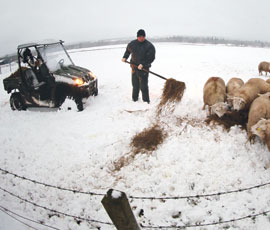Plan to deal with farm finance

Many farmers had part of their overdraft withdrawn by banks after receiving their single farm payment last winter without any negotiation.
“An issue that has cropped up significantly is that banks have used a fair proportion of single farm payments to reduce overdrafts,” said Sue Burgess from Addington Fund.
“It’s meant farmers have not had the working capital they need and have had their hands tied behind their backs.”
However, banks insisted that they were supporting farmers.
Jimmy McLean, head of agricultural services at NatWest and RBS, said they were being as sensitive as possible in difficult circumstances.
Farmers need to demonstrate how finance will be put to good use in their business to ensure they receive adequate funding to tide them through poor weather problems.
Snowstorms battering the UK have had a catastrophic impact on some businesses (News p6), with farmers, who were already financially strained, struggling with stock losses and sourcing feed.
NFU Scotland met with Scottish banking chiefs this week to discuss the immediate impact of the snow and the long-term legacy of the ongoing cold weather on Scottish farm businesses.
In addition, anecdotal evidence from consultants and the NFU suggests farm borrowing has been rising in the past few weeks and may continue to do so throughout this year as farmers deal with on-going budgetary implications.
“You need to have a detailed discussion with your existing bank and do the legwork before you call”
Robert Sullivan
Banks have said they are committed to being sensitive to farmers’ circumstances, however Farmers Weekly is hearing reports of some farmers who are struggling to access vital finance.
Robert Sullivan from Strutt & Parker’s Morpeth office said times were tough for the majority of farmers. “People are running out of money left, right and centre.”
He advised farmers to avoid having a knee-jerk reaction and to consider other financing options before approaching banks.
Farmers should realise money out of existing assets and consider what can be gathered together elsewhere. Sometimes selling an old tractor for a small amount of money makes more sense financially than borrowing, he said.
Another factor to consider is talking to suppliers about a payment plan, for example, arable farmers could buy fertiliser against grain sales later on.
However, for farmers who have exhausted these options, the best approach is to plan carefully before speaking to a bank. “You need to have a detailed discussion with your existing bank and do the leg work before you call,” said Mr Sullivan.
Farmers must understand they cannot keep going back for more finance indefinitely, said Andrew Nicholas, consultant at Harvey Hughes, so it was important to have firm plans in place.
“With a season like it’s been, there has been more pressure than we expected,” he said.
“Some farmers have been pedaling their own boat OK up until now, but there has been a definite increase in farmers asking for finance in just the last three or four weeks.
“Banks are lending, but [only] where they can see a clear plan is in place.”
Monitoring business performance is integral to planning, and some farmers lack even the basic bookkeeping skills required to run a business, which makes it difficult when it comes to putting together a finance application, he said.
Three things banks are looking for when lending:
- a track record of good borrowing
- a business plan going forward
- a certain loan-to-value ratio in the business.
Helen Evans, consultant at Kite Consulting, advised farmers not to assume that all their problems were down to bad weather and also not to think too short term in planning, as going back for finance at a later date because of poor planning could be difficult.
Banks withdraw farmers’ overdrafts
Many farmers had part of their overdraft withdrawn by banks after receiving their single farm payment last winter without any negotiation, according to a farm charity.
“An issue that has cropped up significantly is that banks have used a fair proportion of single farm payments to reduce overdrafts,” said Sue Burgess from Addington Fund.
“It’s meant farmers have not had the working capital they need and have had their hands tied behind their backs.”
However, the banks insisted they are supporting farmers.
Financial planning: Your guide to protecting your finances
